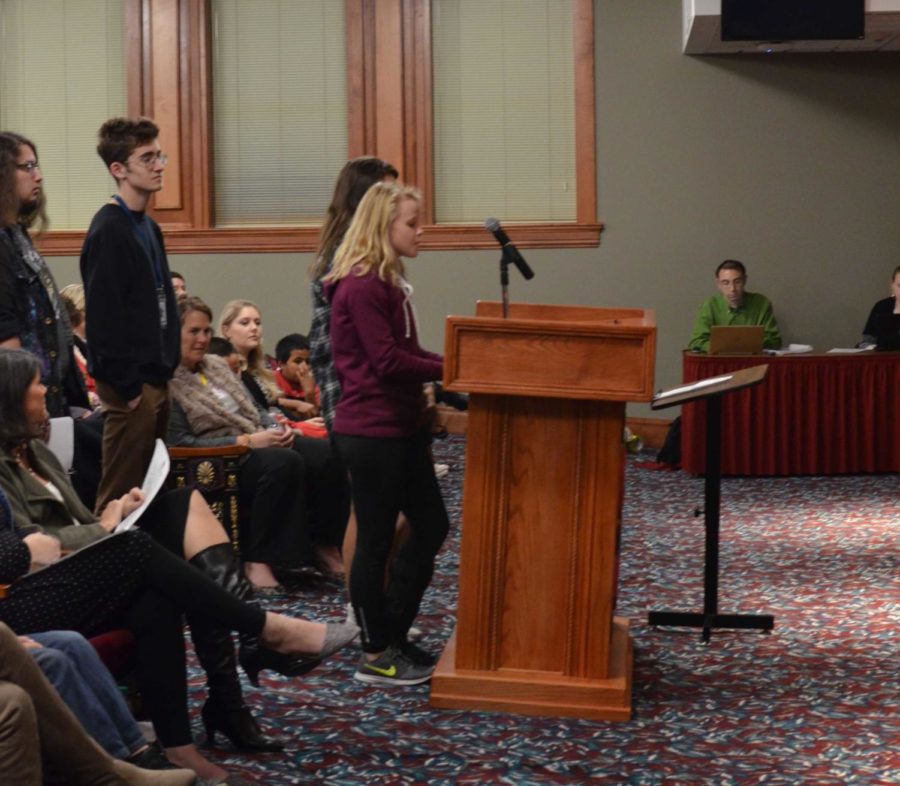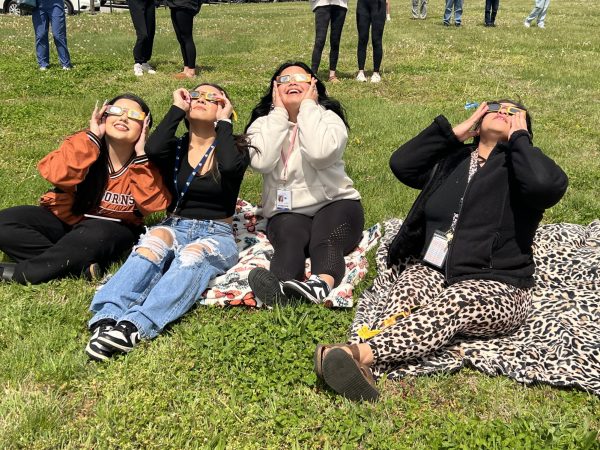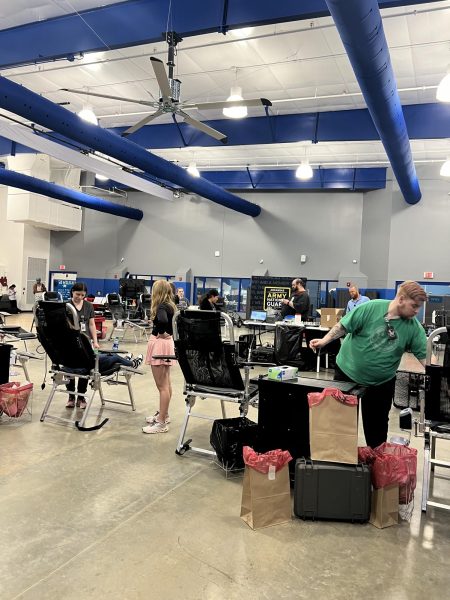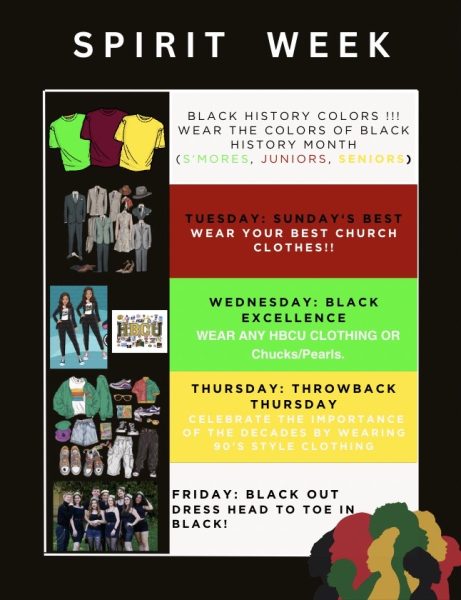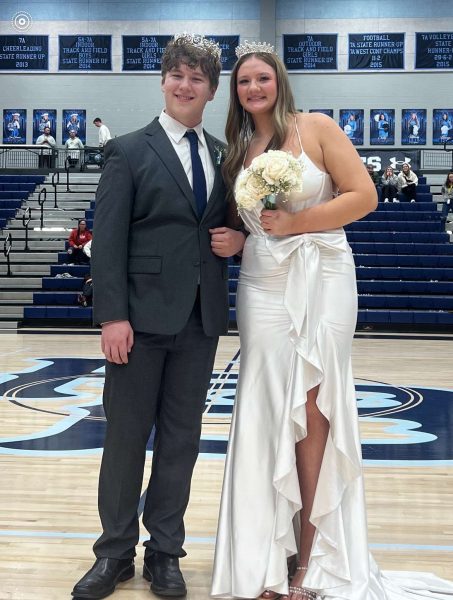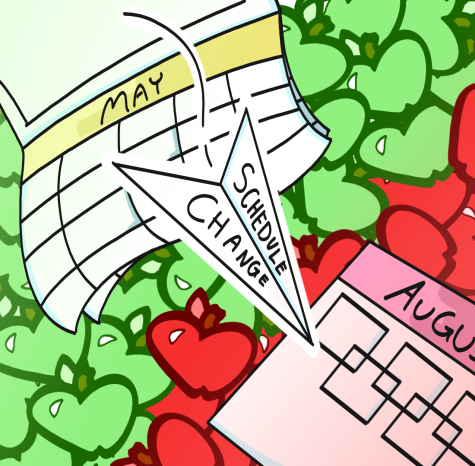Publication students battle district administrators over censorship
Censorship issue garners attention from national media
Senior online editor of The Herald, Kat Carson, hit submit on Wednesday, Dec. 5 to republish the editorial and news article that was demanded to be removed a month earlier.
“I felt pride,” said Carson as she published the story, “but I also felt nerves for what’s to come.”
A small victory is celebrated among the staff in the newsroom, but the matter of censorship is still at hand. Prior to this celebration, The Herald faced censorship from the school district as a result of the publishing of an article discussing athletic transfers.
The Herald received a memo that the Springdale School District is establishing protocols for how student publications wll be published in the future. On the night of Nov. 2, The Herald adviser Karla Sprague was ordered to take down the publication of the article, “Athletes’ Transfers in Question,” a story that was written about the district’s transfer policy, and an editorial “Hear Us Roar.”
While attending a national journalism convention with her students, Mrs. Sprague received a text message from deputy superintendent, Dr. Jared Cleveland, telling her to call him as soon as possible. Dr. Cleveland demanded that the article and editorial be taken down. He later thanked her for taking down the two publications until the district could have the opportunity to “review the materials in question as it relates to AR law and SPS policy.”
“He said that we had violated state law and Springdale Schools policy,” Mrs. Sprague said, “but he never pointed me to where or to what in the articles had violated which law or policy.”
Upon the accusation that the article and the newspaper had violated state and Springdale Schools policy, the staff was confused as to which law or policy had been broken exactly.
Mrs. Sprague met Nov. 5 with Dr. Cleveland, the district’s lawyer Kendra Clay, along with Dr. Paul Griep, HBHS principal, and her own lawyer Brian D. Wood and another witness to discuss the articles and was told that if corrections were made to the article in question, most likely the story would be allowed to be reposted.
“I felt pretty confident after that meeting, that the story would go back up,” Mrs. Sprague said. “Dr. Cleveland and Ms. Clay were going to discuss it with Dr. Rollins and were going to get back to me soon.”
Arkansas state law states that a student publication may not publish if publications are: obscene to minors, libelous or slanderous, an unwarranted invasion of privacy, or create a clear and present danger of the commission of unlawful acts on school premises. Eleven days passed with no explanation.
“Dr. Cleveland has refused to elaborate upon his statement that it did,” Williams said.
Williams attempted to attend a meeting with Mrs. Sprague, her representatives and Dr. Cleveland to participate in the discussion regarding the stories in question. He was denied. A second meeting was held Nov. 16. The result was that neither the article or the editorial could be reposted.
Following the meeting Nov. 16, Dr. Jim Rollins, Springdale School District superintendent, sent a letter to Mrs. Sprague and The Herald staff stating the justification of the removal of the article and editorial.
“The Springdale School District is currently reviewing existing protocols and policies for publishing student articles,” said Rollins in the letter.
In the letter, Rollins states the article is “intentionally negative” and “hurtful.”
“Given my status as the person who actually wrote it, I disagree with his statement,” said junior reporter Jack Williams. “I don’t think the presentation of facts is biased in anyway.”
No member of the district administration has met with the staff or spoken to Mrs. Sprague since the letter from Dr. Rollins was received and the stories were censored.
Not only does the suspension fall over The Herald news team, the yearbook staff has had to adjust their publication schedule as well. The student publications will have to send any future stories to the administration to be reviewed before anything can go to print, be posted online or published.
The administration now has to “approve all of our pages,” said yearbook editor Maddy Stout. “This makes deadlines like a whole week earlier.”
The suspension of printing came from a memo from principal Paul Griep that was sent to Karla Sprague, adviser of the two publications.
“The Springdale School District is currently reviewing existing protocols and policies for publishing student articles,” stated the memo. “Until these protocols are finalized, it is my expectation and the expectation of the district, that no student publications will be printed, posted online, or distributed until they are reviewed by building/district administration.”
The Herald staff had been working on stories for Issue 2 of the paper, but the deadline was missed due to the district’s new expectations.
“We were supposed to go to print that Friday, and when I asked Dr. Griep on Monday if we could print, he said no,” Mrs. Sprague said. “While he may not have meant for us to miss our deadline, we did, which was frustrating. I asked him again at my insubordination meeting Thursday if he could read over the stories, and he said he didn’t have enough time to review the stories.”
Among the confusion, publication students expressed their disappointment.
“We feel like our rights are being violated,” said Stout. “We have a right to publish what is happening at our school and the students deserve to know as well.”
The story of the censorship has become nationwide, with reports and editorials from Buzzfeed News all the way to The Chicago Tribune. Multiple news outlets, well known journalists, and even professors have expressed their support through social media. People flooded twitter with condolences and with offers of support.
One user tweeted, “These students will go far, despite the censorship.” and another from an NYU journalism professor tweeted, “I hope one of these reporters ends up in my class at NYU.”
Due to the recent national coverage that the story of the censorship, the administration released a statement on Dec. 4.
“After continued consideration of the legal landscape, the Springdale School District has concluded that The Har-Ber Herald articles may be reposted.”
Although the articles were allowed to be republished, the publications still remain under prior review.
“I think the most critical piece in all of this,” said Principal Paul Griep, “is a strong working relationship with student publications and the school principal.”
Griep has proposed that the staff meet with him and discuss the articles that would be published in the future.
“We have always welcomed our administrators’ feedback to our work,” Mrs. Sprague said. “We’ve had press conferences in the past with other administrators I’ve had, and my door is always open. We love to talk about what we are doing. My students are proud of their work.”
As a result of this controversy, administrators and journalism teachers across the district met Dec. 12 to determine what prior review and protocols would look like moving forward and to potentially revise the current publications policy.
“I feel like prior review does a disservice to you as a student,” said English lead teacher Amy Johnson.
With prior review, Johnson fears that the students won’t receive the same work experiences that they would without it.
“The questions the students would ask would be changed if they were worried about an outsider’s opinion,” said Johnson about the “disservice” pior causes. “They need to driven by the facts in real time.”
“No, I don’t believe prior review is something needed,” said junior Abby Bradford, a writer on the Wildcat yearbook staff. “We know where we stand.”
Along with several teachers, students have expressed their concerns with prior review and the way the district has handled the articles that resulted in censorship.
“I think by trying to cover up the story, it kind of, blew up in their face,” said English teacher Allison Whitehouse. “As far as how downtown handled it, I don’t like it.”
Both publications have continued to work on stories and prepare yearbook pages for the printer, but Dr. Griep is now reviewing those pages.
Administrators and journalism teachers across the district are scheduled to meet again Jan. 7 to draft a policy for student publications.
